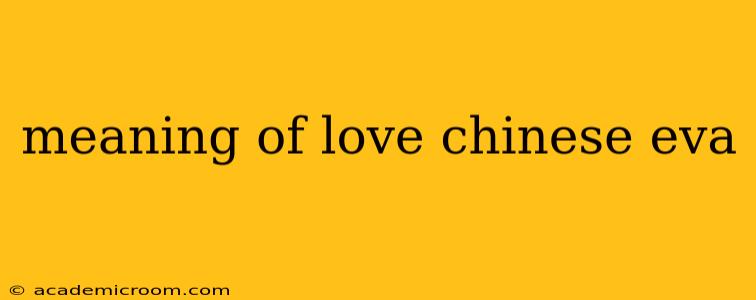The Chinese character 爱 (ài), meaning "love," holds a depth and complexity often exceeding simple translations. While a direct equivalent to the English word "love" might seem straightforward, understanding its multifaceted meaning requires exploring its cultural context and various expressions within the Chinese language. This exploration will delve into the nuances of 爱 (ài), examining its application in different relationships and revealing the rich tapestry of emotions it encompasses.
What are the different types of love in Chinese culture?
Chinese culture, deeply rooted in Confucianism, Taoism, and Buddhism, doesn't compartmentalize love into the neat categories often found in Western discourse (e.g., romantic love, familial love, platonic love). Instead, the expression of 爱 (ài) is nuanced and adaptable depending on the relationship. While the character itself remains constant, the context significantly alters its implication. For instance:
-
Family Love (亲情 qīn qíng): This encompasses the deep, enduring bond between parents and children, siblings, and extended family members. It's a love characterized by responsibility, duty, and unwavering support, often prioritizing the collective good over individual desires.
-
Romantic Love (爱情 ài qíng): While romantic love exists in Chinese culture, its expression might differ from Western norms. Public displays of affection are generally more reserved, and the emphasis often lies on long-term commitment and shared values rather than passionate displays of emotion.
-
Friendship Love (友情 yǒu qíng): This type of love highlights the importance of loyalty, mutual respect, and shared experiences within friendships. It emphasizes a deep bond built on trust and understanding, often lasting a lifetime.
-
Self-Love (自爱 zì ài): While perhaps less explicitly emphasized historically, the concept of self-love and self-respect is increasingly recognized as crucial for personal well-being. This involves taking care of oneself physically and emotionally, setting boundaries, and prioritizing one's needs.
How is love expressed differently in Chinese culture compared to Western culture?
Cultural differences profoundly influence how love is expressed. In some Western cultures, romantic love might be prioritized above all else, with declarations of passionate feelings being common. In Chinese culture, however, the emphasis often shifts towards:
-
Indirect expressions: Love might be conveyed through acts of service, providing for one's family, or showing unwavering support. Open declarations of affection can be less frequent compared to Western norms.
-
Collectivism: The needs of the family or community often take precedence over individual romantic desires. Marriage decisions might involve family input and considerations of social standing.
-
Long-term commitment: Marriage is typically viewed as a lifelong commitment, emphasizing stability and mutual responsibility over fleeting passion.
-
Respect and obedience: In traditional families, respect for elders and adherence to familial expectations play a significant role in expressing love and maintaining harmony.
Is there a difference between 愛 (ài) and other words related to love in Chinese?
While 爱 (ài) is the most common word for "love," other words convey specific shades of affection or related feelings:
-
喜欢 (xǐ huan): This translates to "like" and indicates fondness or preference. It's generally less intense than 爱 (ài).
-
爱慕 (ài mù): This phrase suggests admiration and romantic longing, often used in a more formal or literary context.
-
恋情 (liàn qíng): This term refers specifically to romantic love and passionate feelings.
The selection of the appropriate term depends on the context and the nature of the relationship.
What does the future hold for the expression of love in Chinese culture?
As Chinese society continues to evolve, influenced by globalization and changing social norms, the expression of love is also undergoing transformation. While traditional values remain significant, there is a growing openness towards more direct expressions of emotion, particularly among younger generations. The balance between traditional values and modern influences will continue shaping the understanding and expression of 爱 (ài) in the years to come. The core principle of interconnectedness and responsibility, however, likely remains central to its overall meaning.
